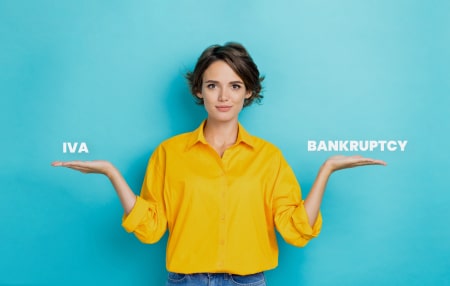
If you find yourself seriously struggling with debt, it could be time to act. Although insolvency is not something that should be considered lightly, in certain circumstances a statutory debt solution can be your best option. Indeed, solutions such as an Individual Voluntary Arrangement (IVA) or bankruptcy can enable you to clear your debts and start to rebuild your finances a lot more quickly than most other solutions. Of course, with both of these options there are also lasting consequences to consider.
IVAs and bankruptcy are two ways of clearing all types of debt, but they differ significantly in their implications and processes. To help you when it comes to making informed decisions about your financial future, this guide outlines the distinctions between IVAs and bankruptcy, highlighting which solution might be best for your situation.
Is an IVA the same as bankruptcy?
No. Although it’s true that bankruptcy and IVAs are both types of insolvency, they each work very differently. Both arrangements come with different legal terms and conditions that must be adhered to, while the lasting legacy of each on your financial profile also differs greatly.
For example, while both bankruptcy and IVAs come with a six-year mark on your credit report and inclusion in the public insolvency register, the way each deals with repayments and the use of personal assets differ. To help you understand the key differences between these two forms of insolvency, we answer three of the common questions relating to each below.
How long does each last?
Bankruptcy
As a rule, bankruptcy represents a much quicker process than an IVA. That is to say, regardless of the restrictions that come with bankruptcy, you can complete your bankruptcy more quickly than you can an IVA. In England and Wales, bankruptcy usually lasts 12 months. During this period you will not be required to pay your creditors anything, so long as you do not receive a windfall during this time. However, personal assets may be repossessed in order for creditors to retrieve some of their money. If you have a regular surplus income at the end of your bankruptcy, the court may set up an Income Payment Order (IPO), which requires you to make monthly payments towards your debts for up to three years. After this period, you will be discharged and and remaining debt, included in the bankruptcy, will be written-off.
IVA
IVAs usually last five years. However, this can be extended to six years in some circumstances. During this period, you’ll be expected to make the monthly repayments you agreed on when entering into an IVA. After this period, if you have adhered to all terms of your IVA, any remaining debts will be written off. Unlike bankruptcy, you typically won’t be required to sell any personal assets such as homes or vehicles in order to pay your creditors, but it always depends on how much these assets are worth. Additionally, you’ll be able to make a lump sum payment to end your IVA early should you come into some money unexpectedly.
Will I lose my home with an IVA or bankruptcy?
Bankruptcy
If you declare bankruptcy, there is a risk you will lose your home. This is because, when bankrupt, your personal finances and all of your assets are placed under the control of an Official Receiver (OR). If the OR deems your property valuable enough to be sold in an effort to pay back some of the money you owe to your creditors, they can sanction this.
It’s worth noting, however, that losing your home during bankruptcy is often a worst-case scenario and does not always happen. This is because property ownership in the UK can be complex. For example, if you own your house outright, you’ll almost certainly lose your home following bankruptcy. Similarly, if you have equity in a property, it’s likely your OR will look to sell your share of that equity. However, if you share equity with another person, such as a spouse or partner, then ONLY your share can be sold. In theory at least, this means you can go bankrupt and still stay in your home.
The same is also true of other valuable personal assets. When bankrupt, your OR could force you to sell items such as cars, jewellery and other valuable items you own. However, certain assets, including essential household items, vehicles and tools required for your job may be exempt from sale. This comes down to the discretion of your appointed OR.
IVA
As long as you maintain the agreed-upon repayments, it’s very unlikely that you’ll lose your home when entering into an IVA. This is because, unlike bankruptcy, an IVA allows you to stay in control of your assets. This includes your home, your vehicles and other valuable possessions.
It’s worth noting that while your home is generally safe upon entering into an IVA, you may be asked to re-mortgage six months before the end of your agreement to release equity. This will depend on the amount of equity you have in your home. If you are asked to do this, you will never be asked to increase your mortgage to more than 85% of the value of your property. Your Insolvency Practitioner (IP) will also assess any new mortgage to ensure it’s still realistically affordable for you.
Will bankruptcy or an IVA affect your job?
Bankruptcy
On the whole, bankruptcy should not affect your employment status. That being said, there are a few specialist professions that can be impacted by bankruptcy, namely those in the financial and legal sectors. If you do work in one of these industries, you will almost certainly be required to contractually disclose news of your bankruptcy to your employer.
Indeed, while most people’s careers will simply not be impacted at all, in some circumstances, bankruptcy could impact your ability to continue working in your current role. For example, following a bankruptcy, you are not allowed to work as a charity trustee, company director, Insolvency Practitioner, MOT authorised examiner, or consumer credit licence holder.
For this reason, if you are considering bankruptcy, it’s important to check your contract of employment and ideally talk to your employer about your situation before making any decisions.
IVA
As with bankruptcy, entering into an IVA usually won’t affect your professional career. However, once again, it could pose a problem if you work in certain industries and roles. For example, if you’re a solicitor or a chartered accountant, there is a chance you’ll not be able to keep working in your profession or, at the very least, have to follow strict conditions.
As a rule though, most professions are not affected by the presence of an IVA on your credit file. However, if you are worried or unsure about the impact of an IVA on your job, talk to your employer and double check the terms and conditions of your contract.
Is an IVA better than bankruptcy?
There isn’t a straightforward answer to this questions. Both forms of managed insolvency have their pros and cons, meaning they will each fit different sets of personal circumstances in different ways. If you’re in a position where you believe bankruptcy or an IVA are your only realistic options, your final decision will need to come down to your individual circumstances and future financial goals.
If you want to avoid the stigma and potential loss of assets associated with bankruptcy, an IVA might be the best option for you. This solution will give you more control over your assets and allow you to pay off your debts on your own terms.
On the other hand, if you have little to no assets and you want to clear your unmanageable debt as quickly as possible, bankruptcy might be the best option. As we’ve discussed, the duration of a bankruptcy is typically shorter than that of an IVA and no monthly repayments are required. However, personal assets such as property and vehicles are likely to be repossessed in the process.
If you find yourself in a situation where you’re considering insolvency, be sure to explore both options thoroughly and seek professional advice before making a decision. You can access free advice by contacting Money Helper or opt to get in touch with us today.

